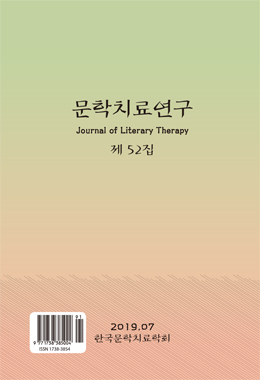본 연구는 청소년이 자살자 심리와 자살 과정에 대한 이해를 바탕으로 자살자에 대한 청소년의 인식 변화를 꾀하고, 이를 통해 제3자에 의한 자살 예방의 효과를 도모하기 위해 청소년 자살예방 문학치료를 설계하고 실행한 사례이다. 그러므로 본 연구의 궁극적인 목표는 자살과 자살자에 대한 청소년들의 기존의 인식에 변화를 꾀하고 이를 통해 제3자의 자살 예방의 행동을 견인하는 데 있다. 이런 목표를 위해 문학치료를 선택한 이유는 문학치료학에서는 행동의 변화가 일어나기 위해서는 그 행동을 지지하고 있는 기반인 자기서사가 근본적으로 변화해야 해야 한다고 보기 때문이다.
이에 2장에서는 『우아한 거짓말』의 서사의 주체의 거짓말 방어기제를 중심으로 자살에 이르는 과정을 밝혔다. 자살자 천지를 중심으로 자살자의 심리상태를 ‘천지가 거짓말을 사용하지 않는 단계’, ‘천지가 거짓말을 방어기제로 사용하는 단계’, ‘천지가 거짓말을 사용할 수 없는 단계’로 나눠서 분석하였다. 1단계에서는 천지의 자기 표현이 수용되지 않는 이유, 2단계에서는 거짓말이 발생되는 원리와 거짓말을 하는 의도, 그리고 거짓말을 방어기제로 쓰는 이유, 또 3단계에서는 방어기제가 무너지는 이유와 그 후의 자살에 이르는 과정에 중점적으로 살펴보았다.
이후 3장에서는 2장에서 진행된 『우아한 거짓말』의 분석을 통하여 문학치료 프로그램을 진행하였다. 청소년과 함께 문학치료를 수행하는 목적은 청소년이 직면할 수 있는 청소년 자살자의 상황과 심경을 이해하고 그들을 도울 수 있는 방법을 모색하는 데 있다. 자살자의 자기서사에 접속하고 공명 함으로써 청소년들의 자기서사를 변화할 수 있는 지점을 마련하고자 하였다.
청소년들은 천지의 문제해결 노력을 하나씩 찾아내면서 천지가 소심하지 않다는 점을 강조하였다. 청소년들은 천지가 화연이 무리에게 ‘싫다’, ‘하지 말라’, 그리고 ‘잘못’이라는 했지만, 거대한 집단을 혼자 힘으로는 대항할 수 없다는 점을 이해해 나갔다. 특히 천지가 거짓말을 할 수 밖에 없는 상황과 거짓말의 숨은 의도를 찾아내면서 거짓말이 방어기제로 작동하는 원리를 알아냈다. 이런 과정에서 청소년들은 천지의 현실적 고통의 무게와 그에 대응하여 자신을 보호하려는 천지의 노력에 크게 공감하였다. 다음으로 청소년들은 자살과 관련된 천지의 감정도 이해하는 길이 열렸다. 청소년들은 천지의 외로움과 우울, 무망감과 인지적 몰락 등 자살의 징후를 찾아냈다. 이후 청소년들은 천지를 지킬 수 있는 방안에 대한 마지막 의견을 주고받았다. 자살자에 대한 제3자의 ‘이해와 공감’이 자살자의 자살 징후를 알아차리고 자살을 예방할 수 있는 방안이라는 사실을 알게 되었다. 이는 자살자에 대한 이해와 공감이라는 인식의 변화가 선행되어야 하며, 인식의 변화가 행동을 견인할 수 있다고 믿기 때문이다.
문학치료 프로그램을 수행하면서 대부분의 청소년들이 자살자의 자기서사에 접속하는 데 어려움은 없었다. 이를 통해 자살위기에 몰린 사람을 도울 수 있는 지점을 찾아내고 도울 수 있는 기반이 마련되었고, 서사 수행 전과는 다르게 행동 변화를 야기할 수 있게 되었다.
This thesis is based on the novel named ‘Thread of Lies’. In the novel there is a teenage girl named Cheonji. When Cheonji was bullied, she asked for help from her family, but they laughed it away. So, she pretended to be fine, but it didn't work. Even though she actively tried to solve the problem among her peer group, it also failed and drove her to suicide. Based on the plot, this novel is identifying the mental state and the process of suicide.
I analyzed the process of Cheonji's suicide under three conditions: using the lie, using the lie as a defense mechanism, and not using the lie as a defense mechanism. First, I focused on Cheonji's expressions and the reason these expressions are ignored. Next, I denote the mechanism of the lie and Cheonji’s reasoning. Finally, I analyzed the failure of Cheonji's defense mechanism and her suicide.
In Chapter Three, I discuss a case study of literary therapy with adolescents using this novel. The purpose of literary therapy with young people is to identify a way to understand and address suicidality in their peers. Literary therapy helps young people empathize with the suicidal character and implement minor changes to address this issue in their daily lives.
The participants reported that Cheonji is not timid and identified her effort to solve problems herself. In particular, as the treatment progressed, participants were able to understand the inevitable situation of Cheonji who cannot fight back to the huge group. After, they focused on Cheonji’s feelings. They identified warning signs of suicidality, such as loneliness and depression, feelings of embarrassment, and cognitive decline. Following this activity, students reported their final opinions on how to protect Cheonji. They specifically focused on Mira, a student in the same class as Cheonji who was once her close friend that was aware of Hwayeon's bad deeds. However, they acknowledged that taking the victim's side is a difficult task that requires courage.
In conducting the literature therapy program, most adolescents had no difficulty accessing the narrative of suicide. This provides a foundation for identifying risk factors and aiding people who may be suicidal as well as implementing positive behavioral changes.


